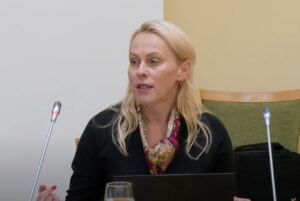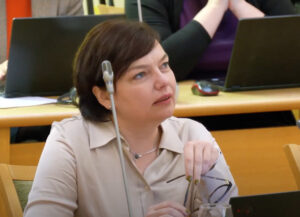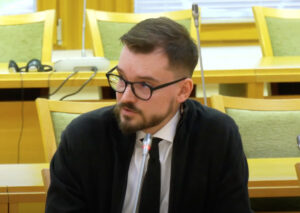The processes of digitization are rapidly changing the entire world, and in this context, it becomes clear that if countries and businesses do not invest in harnessing the potential of artificial intelligence, big data solutions, and other digital tools, the digital divide between advanced and leading economies in the world will continue to widen over time.
In order to reduce this digital divide, the Committee for the Future of the Republic of Lithuania, in collaboration with the researchers from the Faculty of Economics and Business at Kaunas University of Technology, has initiated discussions involving business, politicians, and academics to review the main problems, challenges, and opportunities presented by the rapid advancement of technology.

One of the primary issues highlighted in the discussion is Lithuania’s position on the European innovation scoreboard. For over 20 years, the country has remained in the category of mid-range innovators on the continent and has not ascended to the higher tier of leading innovators. According to Monika Petraitė, a researcher in the “In4Act” project and professor at Kaunas University of Technology, Lithuania remains a technological periphery, with the country importing more technology than it exports.
“One of the reasons for this problem is the predominance of small and medium-sized businesses in Lithuania, which have less capacity to invest in innovation compared to larger enterprises. We need to consider this sector, its issues, challenges, and opportunities, as it employs the majority of the workforce, dominates key employment parameters, and contributes significantly to the country’s Gross Domestic Product (GDP),” says Professor Petraitė.
Mantas Vilkas, the researcher for the “In4Act” project, adds that when it comes to the use of artificial intelligence solutions in companies, Lithuania lags behind the European Union (EU) average. Only 4.5% of the country’s companies implement at least one artificial intelligence solution, whereas, for example, in Denmark, almost 24% of companies utilize one or more such solutions.

“In Lithuania’s manufacturing sector, 59% of companies have no IT employees, and 83% of companies have no data science specialists. For this reason, we need to encourage the development of interdisciplinary competencies so that graduates in both social and engineering sciences acquire strong knowledge and skills in information systems and data science,” says the professor.

As the number of people suffering from chronic illnesses drastically increases worldwide, one of the biggest challenges for nations is rising healthcare system costs. Digitally efficient healthcare systems, according to Professor Asta Pundzienė from Kaunas University of Technology and a member of the “In4Act” project committee, provide a solution to this problem.
“Digital health platforms can help reduce transportation costs, hiring expenses for specialists, and expedite disease diagnosis. Detecting diseases early makes their treatment much more cost-effective and, of course, more efficient,” says Professor Pundzienė.
While Lithuania has a national electronic health system called “e.sveikata,” the efficient implementation of the system poses certain difficulties. One of the main problems, as identified by the researcher, is limited access to data.
“Lithuania’s state-run hospitals are required to upload data to ‘e.sveikata,’ but the state cannot regulate the work of private healthcare institutions, which results in the system lacking nearly 50% of data. To ensure the system operates efficiently, the involvement of all parts of the system is necessary,” says Pundzienė.
The researcher also adds that effective operation of the system is hindered by the lack of regulation, the absence of evaluation of the impact of digital health, and models for assessing the socio-economic benefits and payment for digital health services.
“Beyond regulation, compensation, and implementation, there is a significant shortage of initiatives for changing the mindset, education, and training. When training healthcare professionals and related specialties, modules for acquiring digital skills should be integrated. Consequently, society should also be educated,” says Professor Pundzienė.
In discussions about the country’s digital landscape, participants turned their attention to the significant issue of the shortage of specialists. Although compared to other EU countries, Lithuania has a higher number of individuals with higher education, only 66% of those with higher education are inclined to periodically update their knowledge.

“Due to the development of organizations and networking, the appearance of platform economy competencies, which were previously mandatory only for top-level managers, is now required for specialists at other levels,” says Dr. Kęstutis Duoba.
For a long time, educational institutions focused predominantly on disciplinary subjects. According to Duoba, instead of disseminating competencies among market participants, our educational institutions narrowed them down. This is the reason why, after completing a bachelor’s degree in one field, transitioning to another occurs exceptionally rarely. In contrast, international institutions view education from a different perspective, aiming to cultivate broad competencies and versatile specialists.
“We need to react quickly so that we don’t remain confined to narrow disciplines and can ensure the competencies required for individuals with higher education. Today’s competency descriptions in higher education are developed based on past scenarios. To enable higher education to respond quickly to changes in the environment, much more flexible regulations are needed, allowing movement in various directions significantly faster,” says Professor Petraitė.
The discussion in the Lithuanian Parliament’s Committee for the Future was part of the project “In4Act,” conducted by researchers from the School of Economics and Business at Kaunas University of Technology and funded by the European Union’s “Horizon 2020” project. Learn more about “In4Act” here: https://in4act.ktu.edu/.


